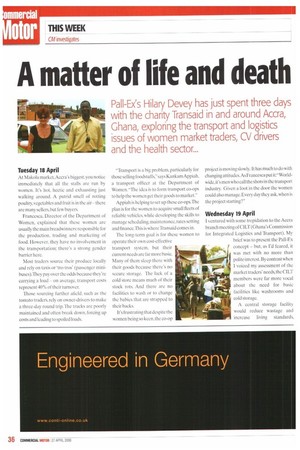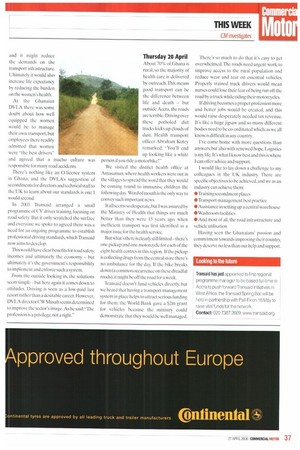A matter of life and death
Page 36

Page 37

If you've noticed an error in this article please click here to report it so we can fix it.
Pall-Ex's Hilary Devey has just spent three days with the charity Transaid in and around Accra, Ghana, exploring the transport and logistics issues of women market traders, CV drivers and the health sector...
Tuesday 18 April
At Makola market, Accra's biggest, you notice immediately that all the stalls are run by women. It's hot, hectic and exhausting just walking around. A putrid smell of rotting poultry, vegetables and fruit is in the airthere are many sellers, but few buyers.
Francesca. Director of the Department of Women, explained that these women are usually the main breadwinners: responsible for the production. trading and marketing of food. However, they have no involvement in the transportation; there's a strong gender barrier here.
Most traders source their produce locally and rely on taxis or -tro-tros (passenger minibuses).They pay over the odds because they're carrying a load on average, transport costs represent 40% of their turnover.
Those sourcing further afield, such as the tomato traders, rely on owner-drivers to make a three-day round trip. 'the trucks are poorly maintained and often break down, forcing up costs and leading to spoiled loads. "Transport is a big problem, particularly for those selling foodstuffs," says Kankarn Appiah, a transport officer at the Department of Women. "The idea is to form transport co-ops to help the women get their goods to marker Appiah is helping to set up these co-ops.The plan is for the women to acquire small fleets of reliable vehicles, while developing the skills to manage scheduling, maintenance, rates setting and finance.This is where Transaid comes in.
The long-term goal is for these women to operate their own cost-effective transport system, but their current needs are far more basic. Many of them sleep there with their goods because there's no secure storage. The lack of a cold store means much of their stock rots. And there are no facilities to wash or to change the babies that are strapped to their backs.
It's frustrating that despite the women being so keen. the co-op project is moving slowly. It has much to do with changing attitudes. As Francesca put it:"Worldwide.it's men who call the shots in the transport industry. Given a foot in the door the women could also manage. Every day they ask, when is the project starting?"
Wednesday 19 April
I ventured with some trepidation to the Accra branch meeting of CILT (Ghana's Commission for Integrated Logistics and Transport). My brief was to present the Pall-Ex concept but, as I'd feared, it was met with no more than polite interest. By contrast when I voiced my assessment of the market traders' needs, the CILT members were far more vocal about the need for basic facilities like washrooms and cold storage.
A central storage facility would reduce wastage and increase living standards, and it might reduce the demands on the transport infrastructure. Ultimately it would also increase life expectancy by reducing the burden on the women's health.
At the Ghanaian DVLA there was some doubt about how well equipped the women would be to manage their own transport, but employees there readily admitted that women were the best drivers" and agreed that a macho culture was responsible for many road accidents.
There's nothing like an 0-licence system in Ghana, and the DVLA's suggestion of secondments for directors and technical staff to the UK to learn about our standards is one I would second.
In 2003 Transaid arranged a small programme of CV driver training, focusing on road safety. But it only scratched the surface and everyone we spoke to agreed there was a need for an ongoing programme to establish professional driving standards, which Transaid now aims to develop.
This would have clear benefits for road safety, incomes and ultimately the economy — but ultimately it's the government's responsibility to implement and enforce such a system.
From the outside looking in, the solutions seem simple— hut here again it comes down to attitudes. Driving is seen as a low-paid last resort rather than a desirable career. However, DVLA director CW Musah seems determined to improve the sector's image. As he said: "The profession is a privilege, not a right."
Thursday 20 April
About 70% of Ghana is rural, so the majority of health care is delivered by outreach. This means good transport can be the difference between life and death — but outside Accra, the roads are terrible. Driving over these potholed dirt tracks kicks up clouds of dust. Health transport officer Abraham Kotey remarked: "You'll end up looking like a white person if you ride a motorbike!"
We visited the district health office at A masaman, where health workers were out in the villages to spread the word that they would be coming round to immunise children the following day. Word of mouth is the only way to convey such important news.
It all seems so desperate. hut I was assured by the Ministry of Health that things are much better than they were 15 years ago, when inefficient transport was first identified as a major issue for the health service.
But what's there is clearly still limited—there's one pickup and one motorcycle for each of the eight health centres in this region. If the pickup is collecting drugs from the central store there's no ambulance for the day. If the bike breaks down (a common occurrence on these dreadful roads). it might be off the road Ibr a week.
Transaid doesn't fund vehicles directly, but we heard that having a transport management system in place helps to attract serious funding for them: the World Bank gave a $2m grant for vehicles because the ministry could demonstrate that they would be well managed. There's so much to do that it's easy to get overwhelmed. The roads need urgent work to improve access to the rural population and reduce wear and tear on essential vehicles. Properly trained truck drivers would mean nurses could lose their fear of being run off the road by a truck while riding their motorcycles.
If driving becomes a proper profession more and better jobs would be created, and this would raise desperately needed tax revenue. It's like a huge jigsaw and so many different bodies need to be co-ordinated which, as we all know, is difficult in any country.
I've come home with more questions than answers. hut also with renewed hope. Logistics is my life. It's what I know best and this i.s where I can offer advice and support.
I would like to lay down a challenge to my colleagues in the UK industry There are specific objectives to be achieved, and we as an industry can achieve them:
*Training secondment places
• Transport management best practice • Assistance in setting up a central warehouse • Washroom facilities • And most of all, the road infrastructure and vehicle utilisation Having seen the Ghanaians' passion and commitment towards improving their country, they deserve no less than our help and support.
Looking to the future
Transaid has just appointed its first regional programme manager to be based full-time in Accra to push forward Transaid initiatives in West Africa; the Transaid Spring Ball will be held in partnership with Pall-Ex on 18 May to raise vita! funds for the network.
Contact: 020 7387 2669; www.transaid.org




































































































































































































